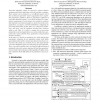Free Online Productivity Tools
i2Speak
i2Symbol
i2OCR
iTex2Img
iWeb2Print
iWeb2Shot
i2Type
iPdf2Split
iPdf2Merge
i2Bopomofo
i2Arabic
i2Style
i2Image
i2PDF
iLatex2Rtf
Sci2ools
119
click to vote
DAC
1998
ACM
1998
ACM
A Tool for Performance Estimation of Networked Embedded End-systems
Networked embedded systems are expected to support adaptive streaming audio/video applications with soft real-time constraints. These systems can be designed in a cost efficient manner only if their architecture exploits the “leads” suggested by clever compiletime performance estimators. However, performance estimation of networked embedded systems is a non-trivial problem. The computational requirements of such systems show statistical variations that stem from several interacting factors. At the slowest time scale, applications can adapt to network bandwidth by configuring the processing functionality of their tasks (e.g. compression parameters). Also, there could be significant execution time variations within a task. Thus, it is tricky to compute the net processing demand of several such applications on a system architecture, especially if the system schedules these applications using prioritized run-time schedulers. In this paper, we describe an analytical tool called AsaP...
Computer Architecture | DAC 1998 | Networked Embedded Systems | Performance Estimation | Soft Real-time |
Related Content
| Added | 05 Aug 2010 |
| Updated | 05 Aug 2010 |
| Type | Conference |
| Year | 1998 |
| Where | DAC |
| Authors | Asawaree Kalavade, Pratyush Moghé |
Comments (0)

